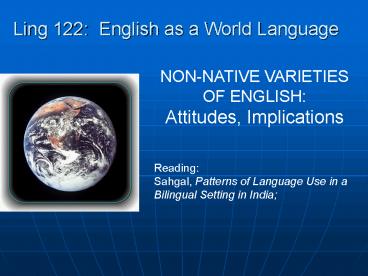Ling 122: English as a World Language - PowerPoint PPT Presentation
1 / 10
Title:
Ling 122: English as a World Language
Description:
Sahgal, Patterns of Language Use in a Bilingual Setting in India; ... Slavic. Indo- Iranian. Indic Iranian. 5. Possibly a third co-ordinate branch within Indo-Iranian ... – PowerPoint PPT presentation
Number of Views:60
Avg rating:3.0/5.0
Title: Ling 122: English as a World Language
1
Ling 122 English as a World Language
NON-NATIVE VARIETIES OF ENGLISH Attitudes,
Implications Reading Sahgal, Patterns of
Language Use in a Bilingual Setting in India
2
Sahgal, Patterns of Language Use in a Bilingual
Setting in India
Sahgals article is about a range of peoples
attitude towards English in India. The official
language of India -----gt Hindi The associate
official language of India -----gt
English Numbers of National languages
recognized ----gt 15
2
3
Sahgal, Patterns of Language Use in a Bilingual
Setting in India
- Main Rivalry - Between Hindi and English
- Englishs Advantage over Hindi It does not
threaten any ethnics group identity since it is
not the language of any major group - It is the main language of education,
administration, the mass media, science and
technology - Hindi is still in the process of standardizing
and codifying the specific registers - Any language which aspires to replace English at
the national level needs to acquire the
functional load of English - English has tremendous prestige in India.
3
4
Sahgal, Patterns of Language Use in a Bilingual
Setting in India
Research Question Patterns of Language Use in
three domains Family, Friendship, and
Institutional. Research Site Delhi Research
Targets Hindis, Bengalis, and
Tamilians. Participants Middle or Upper Strata
of Society. Language use Hindis ----gt Hindi and
English Bengalis ---gt Bengalis, Hindi, and
English Tamilians ---gt Tamilians, Hindi,
and English Language Affiliation Indo-European
---gt Hindi and Bengali Dravidian ---gt Tamil,
Telugu, Malayalam, Brahui, Tulu, etc
4
5
Indo-European outline of family tree
Indo-European
Indo- Iranian
Italic
Germanic
Celtic
Balto- Slavic
........
Possibly a third co-ordinate branch within
Indo-Iranian Nuristani in N.E. Afghanistan
(e.g. Ashkun, Prasun)
Indic Iranian
Western Eastern
N.Western S. Western Central Eastern
FarsiPersian, Kurdish, Baluchi, ......
Pashto, Ormuri, Ossetian, Yagnob, ......
Panjabi, Sindhi, Kashmiri, Romani, .....
Gujarati, Marathi, Konkani, Sinhala, .....
Hindi-Urdu, Marwari, Maithili, Nepali, .....
Bengali, Assamese, Oriya, .....
5
Many difficulties in deciding Indic grouping
6
Approximate distribution of language families in
South Asia
Indo-European
Dravidian
Sino-Tibetan
Austro-Asiatic
(Isolate)
6
7
Sahgal, Patterns of Language Use in a Bilingual
Setting in India
Findings (Table 20.1) Family Domain - Mother
tongue stands out as the single dominant
language of the family for all the communities -
Benglis had the highest score - Tamilian had the
lowest score - Hindi speakers used English the
least - Tamilian speakers used English the
most - Bengalis and Tamilians have resisted the
pressures of the host society and maintained
their linguistic identity.
7
8
Sahgal, Patterns of Language Use in a Bilingual
Setting in India
Findings (Table 20.1) Friendship Domain -
English emerges as the dominant language of the
friendship domain for Bengalis and Tamilians. -
Hindi speakers use their mother tongue in this
domain - Bengalis and Tamilians often live in
mixed neighborhoods where they have to interact
with several other Indian communities (Still, the
choice of English over Hindi is interesting).
8
9
Sahgal, Patterns of Language Use in a Bilingual
Setting in India
Findings (Table 20.1) Institutional Domain -
English is the dominant language of this
domain - Reason English is the main language
of administration and education - Hindi speakers
alternate between the two languages in this
domain.
9
10
Sahgal, Patterns of Language Use in a Bilingual
Setting in India
Conclusions - English has acquired
more functional roles - English is the main
language of friendship and institutional
domains - The evolution of the educated Indian
English Most of the informants preferred the
local variety of English - English is treated
not as a foreign language, but as part of the
cultural identity of India - Indian bilingualism
of English in India is NOT replacive. Lesson
Attitude towards bilingualism in English varies
from region to region all over the world.
10































